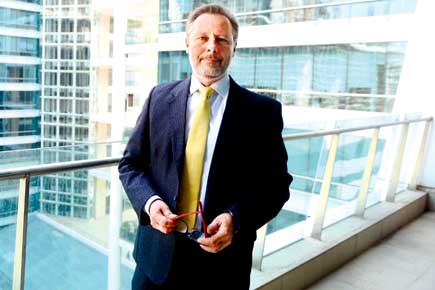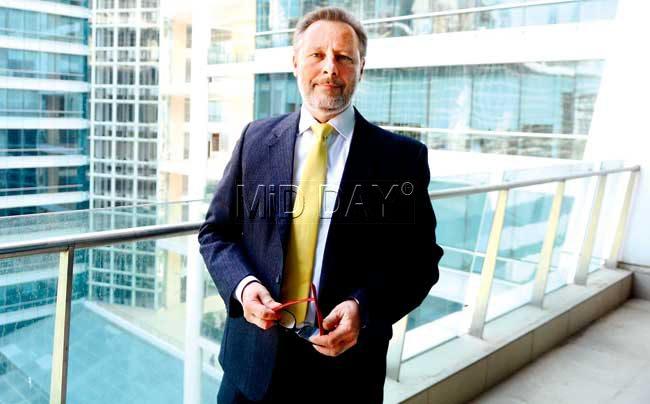Rob Lynes, director, British Council India, tells Kareena Gianani about his impressions of an emerging India, life during the Cold War and the Gulf War and more in a candid chat

Rob Lynes, Director, British Council, loves walking through hidden alleys of Delhi and Kolkata, and discovering the many Indias this country holds, on foot
Rob Lynes, Director, British Council
ADVERTISEMENT
A few minutes into a conversation with Rob Lynes, director, India, British Council, with one eye on the clock, I mistakenly refer to the organisation as 'British Council Library'. Lynes is intrigued.
Rob Lynes, Director, British Council, loves walking through hidden alleys of Delhi and Kolkata, and discovering the many Indias this country holds, on foot. Pic/Bipin Kokate
And then — "See, that! My biggest problem is right in front of me," he exclaims, startling me. "Everywhere I go in India, I find an ambivalence about what we really stand for. For many, it is all about the British Council Library; some even call it 'British Library'. I am very interested in how young people relate to us — it tells me that the British Council has to reimagine its legacy in 21st century India," elaborates Lynes.
The British Council, he feels, needs to build on its history in the country, but also remember that the country it first set foot upon in 1948 was a radically different one than what it is today. Back then, says Lynes, the British Council worked with a small minority of the Indian elite who had access to foreign education; why, to the English language itself. However, post 1996, especially after the advent of the Internet, India saw unprecedented growth in economy and ambition, and had wider access to educational options — all of which meant that it began knocking on doors other than the British Council's alone. "Since then, our biggest challenge has been to learn to engage with this rapidly-changing country," he says.
In the '80s, Lynes's sister spent a few years in India and sent him vivid photographs. "As a young man, fresh into his '20s, I thought I knew the country well enough. That notion was dispelled soon after I first came here in 2011 after taking up this job," smiles Lynes. He feels that the younger generations in the UK and India are less connected than ever, the huge Indian diaspora in the UK notwithstanding. "Unlike their parents and grandparents, youngsters here have no natural connection with the UK, and vice versa. There is a need to build a new relationship and what better way than to link the two cultures with arts and education?" he elaborates.
Linking cultures is something that Lynes knows only too well, having done that often in his lifetime. It all began with the idea of escape. Lynes grew up in a village in Yorkshire county in the UK, and went to a local grammar school. "Since I was a little boy, I knew that moving away to another country was the thing to do. Both my parents had emigrated from Canada, and I knew no other way of life. More so, life in Yorkshire was insular, every kid who came to school with me lived within a three-mile radius. There was no question in my mind that I would go overseas when I grew up," he remembers.
Life during the Cold War
Lynes studied Russian and Polish in the UK and moved to Berlin for four years during the Cold War. "But I cannot tell you what I was there for," he smiles. After Berlin came a year-long stint in Australia where Lynes retrained as a teacher and later migrated to Budapest for five years to teach Economics. He later became Director of one of Hungary's largest language schools. "Budapest was a hedonistic city, even at the height of the Cold War. Living in Eastern Europe in the '80s could be quite an experience — especially living in countries on either side of the Cold War. It was a historical time, and change was always around the corner," says Lynes.
As fate would have it, Lynes was in Egypt during the 1991 Gulf War. He also travelled to Moscow during the 1991 coup, in which the Communist Party of the Soviet Union tried to wrestle control of the country out of Soviet president Mikhail Gorbachev's hands. "I cannot explain it. I guess I am always drawn to places where something is happening," he shrugs.
After Egypt, Lynes briefly lived in Hungary, where he met his wife. He has two daughters aged 20 and 22.
In 1995, Lynes returned to the UK and joined the British Council, and later moved to Saudi Arabia for three years with his family. Lynes remembers those years as "very surreal", and fraught with changes and challenges to his perceptions. "I imbibed a different culture altogether — my wife was in an abaya, restaurants were demarcated for men, women and families; you and I, for instance, could have never had a conversation like this.
On the other hand, I've never felt safer — there was no violence, and I found people to be tolerant. All of it made me think deeply about the Western gaze, and how it looks at the world outside of itself as either 'right' or 'wrong'. But there I was, flitting between cultures, bringing them together. It taught me not to see the world in black and white. I stand by it even today, no matter where I go," emphasises Lynes.
Life in India
When in India, Lynes says lines between his personal and professional life are often blurred. "I love art. In Mumbai, I spend my evenings going to gallery openings, exhibitions and catching up on cultural events." What Lynes loves the most, however, is discovering the country beyond the big cities. His most intimate memories of India include a trip to Orchha in Madhya Pradesh and walking through lanes of Kolkata and Delhi. "My wife has fallen in love with Indian tribal art, and she collects Gond and Warli art these days, if I remember correctly," he smiles. The country is quite the muse for avid painter. "I paint abstracts, and find being in India very inspiring — it doesn't feature in my works directly, but the colours and freshness I owe to India," admits Lynes.
Lynes may spend most of his time in big cities, but his heart is in the country and the tranquility he left behind as a young boy. "We have a home in the country in the UK, and in a quieter part of Budapest, where I know I'll finally live post-retirement. My wife loves walking and when we are in London, on weekends, we take off to quiet, nearby districts where the green and silence is endless," says Lynes fondly.
Breaking down hierarchy
Meanwhile, Lynes' pet project in India involves throwing open the British Council to people — digitally. "I want to make British Council's resources accessible to people — with one password, every journal, document, every old manuscript, even research, could be a click away. I want to build an environment wherein people can be more involved with British Council's events and co-create the social interactions they seek." Lynes, however, does not undermine the fact that for a truly meaningful connection between India and the UK, offline events are important, too. "I also plan to introduce more platforms in the physical environment," he adds.
Lynes hopes to achieve that with a leadership he best defines as one having a strong value system. "As a leader, I believe in constantly learning and am very value and purpose driven. I am a passionate leader and prefer to empower people. India, however, is very hierarchical. It is quite contradictory, because India has a strong entrepreneurial spirit, too, which goes against hierarchy. So, I am trying to break down barriers — I am trying to tell my team that you are what you do, not where you are in the pecking order," he concludes.
 Subscribe today by clicking the link and stay updated with the latest news!" Click here!
Subscribe today by clicking the link and stay updated with the latest news!" Click here!






